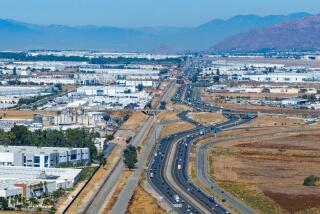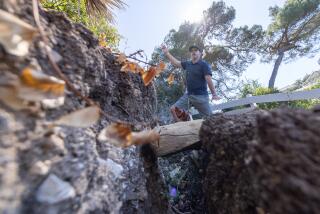Hidden Hills Weighs Gain in Commercial Annexation
- Share via
Hidden Hills, an exclusive residential city of 2,000 with more bridle paths than roads, is considering annexing a commercial center near the Ventura Freeway.
The affluent community is sizing up the commercial area and 300 acres of sparsely inhabited brushland as a source of tax revenue and a buffer against encroaching commercial development, City Atty. Wayne Lemieux said Tuesday.
But the plan under consideration would keep the businesses outside the ornamental fencing and gates for which Hidden Hills is known.
In January, the city annexed five acres around its front gate, which brought the first commercial enterprises into its boundaries--a law firm and a real estate agency. That effort, too, was designed to gain control over property that affects residents’ “quality of life,” Lemieux said.
After that “successful undertaking,” the city started looking for a way to preserve its southern flank, along the Ventura Freeway, he said.
Lemieux said the city’s revenue is currently derived solely from property taxes, which are not sufficient to pay for city services such as sewers, road work and police protection.
$300,000 City Budget
“A lot of people think there’s a lot of money in Hidden Hills,” Lemieux said. “But, believe it or not, the city doesn’t have much revenue to work with. The city budget is something like $300,000.”
And, because the revenue comes from just one source--property taxes--the city is vulnerable to changes in the way that revenue is apportioned, Lemieux said.
“Every once in a while the Legislature tinkers with how that property tax is divided up,” the city attorney said. “We’re concerned that we’ll wake up one day and find that all that revenue is going somewhere else.”
The area considered for annexation, now part of unincorporated Los Angeles County, includes about 100 businesses, ranging from kennels and a saddlery to computer companies in a business park. Part of their state sales tax would go to Hidden Hills should the annexation go through.
But the mayor of Hidden Hills, Alana Knaster, said the new revenue would be less important than the fact that annexation would allow the city to control development along its southern border and provide a buffer between the residential area and commercial development that is spreading along the Ventura Freeway.
‘City Is Really Complete’
“Our city is really complete as far as we are concerned,” Knaster said. “But we don’t have a large say in things going on in unincorporated county areas that have an impact on us.”
Hidden Hills would provide the landowners with better services than they now have, she said, asserting: “We would budget much more for police and other services for the area than the county can.”
If the annexation process is to proceed, Hidden Hills must first garner the support of more than 50% of the property owners in the area to be annexed.
The proposal would then go to the county’s Local Agency Formation Commission, which evaluates any changes in city boundaries.
The annexation effort is still in the early stages, Knaster said. “We’ve only met with three property owners.” But she said that five or six of the 35 property owners in the area live in Hidden Hills and would probably support the annexation.
Lemieux and Knaster stressed that Hidden Hills is not trying to change its character. The 2.5-square-mile city requires homes to be on at least one-acre lots and includes 30 miles of horse paths.
There would not even be an attempt to connect the residential area--which has just two entrances, both guarded--with the commercial area along the freeway.
‘Change a Line on Map’
“If the property is annexed, we would not add a gate, we would not do anything except change a line on the map downtown somewhere,” Lemieux said. “So, from the outside, nobody would notice anything.”
Several businessmen in the area being considered by Hidden Hills said Tuesday that it is too early to judge whether annexation would be a good thing.
“I like Hidden Hills a lot,” said Jon Lindberg, vice president and part owner of Calabasas Saddlery on Craftsman Road, which serves many of the horse enthusiasts from the city. “They are an important customer base for us, and I have a lot of friends who live there.”
But, “until a formal proposal comes along, you can flip a coin,” he said.
Phil Mundy, whose company, Mundy Medical Marketing, sells medical supplies, leaned toward independence or inclusion in the proposed city of Calabasas to the south.
“Hidden Hills is a residential area, not a business area,” Mundy said.
However, according to Robert Hill, president of the Calabasas Cityhood Study Committee, an agreement was reached with Hidden Hills six weeks ago that Calabasas would not try to include the area within its bounds.
More to Read
Sign up for Essential California
The most important California stories and recommendations in your inbox every morning.
You may occasionally receive promotional content from the Los Angeles Times.










